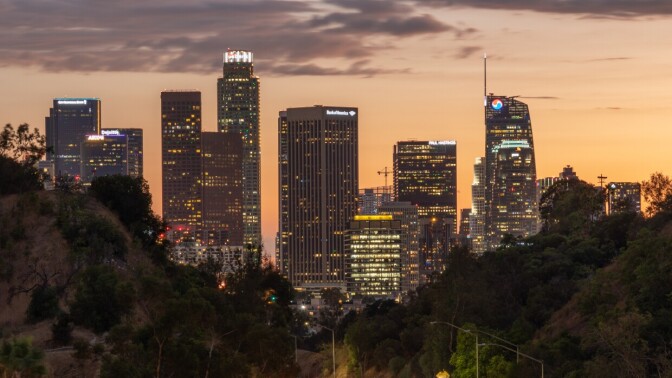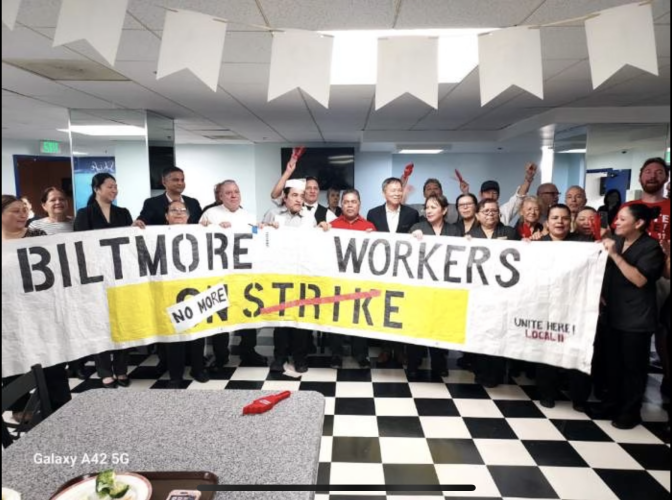This story is free to read because readers choose to support LAist. If you find value in independent local reporting, make a donation to power our newsroom today.
Los Angeles hospitality workers' Olympian pay raise and the industry's ability to absorb it

This article was produced by Capital & Main. It is published here with permission.
In the months preceding the Los Angeles City Council’s vote to gradually improve tourism industry workers’ wages to $30 an hour, the hotel and developer lobbies threw everything they had into pushing one apocalyptic message: Paying higher wages would prompt the businesses to retrench, downsize operations and abandon projects in and around the city.
They brought the heat. The Hotel Association of Los Angeles warned the local Olympic organizing committee that it might not be able to honor contracts to furnish rooms for the 2028 L.A. Games. One property company said its investors would kill a planned expansion of a Hilton in Universal City if the higher wage kicked in. Another chief executive asserted that the city “has been crossed off the map by investors” in hotel projects.
The councilmembers approved the measure anyway. And one reason they did may be that L.A. hotel owners have already demonstrated they can handle a $30-an-hour wage — and much more.
The council’s action came less than a year after a prolonged series of rolling strikes by unionized Los Angeles hotel workers that resulted in new contract agreements with some 60 area hotels. (Disclosure: UNITE HERE Local 11, which led those strikes, is a financial supporter of Capital & Main.)
Those 2024 agreements are illuminating, and there’s no doubt the members of the City Council have been taking notes. Under the union contracts, most room attendants will see their hourly wage reach $35 by July of 2027. Nontipped workers received wage increases of 40% to 50% over the four-and-a-half-year life of those deals, and the hotels agreed to return to pre-pandemic staffing levels and mandatory daily room cleanings.
The new city ordinance initiates a series of annual raises beginning in July, when the workers’ minimum hourly pay will increase to $22.50. (The current hotel minimum wage in Los Angeles is $20.32.) They won’t hit the $30 mark until July of 2028. Airport and hotel workers will also receive $8.35 per hour to cover health care costs by July of next year.
That’s a lot of numbers. Here is some context: According to the Massachusetts Institute of Technology’s Living Wage Calculator, a single working adult in Los Angeles County with one child needs to earn $48.65 per hour just to cover basic living expenses. If two adults are working and have one child, each of those adults must earn nearly $27 an hour.
“We want to be paid enough to live where we work,” Brenda Mendoza told me. Mendoza, a unionized worker at the JW Marriott L.A. Live hotel, is a Koreatown native; she and her family spent nearly a decade trying to afford life in the area before finally moving to San Bernardino County a couple of years ago. Mendoza, her husband and two sons make a nearly 200-mile round-trip commute daily to their jobs in Los Angeles.

No hourly wage increase is going to suddenly solve the affordable housing crisis in the L.A. area, but the city’s new ordinance is a massive development nonetheless. For airport workers like dishwashers and food caterers, the raises amount to a pay bump of 56% over three years, and it’s a 48% hike in the minimum wage for hotel workers.
UNITE HERE and other pro-labor organizations pushed hard for the ordinance’s passage — but that’s not a new tactic. The groups have spent decades trying to change the labor landscape in and around Los Angeles, stumping for pro-union candidates for public office and helping to pass higher minimum wage requirements in Santa Monica, West Hollywood, Glendale and Long Beach.
In almost every case, those efforts were met with dire warnings from industry leaders and lobbyists about the deleterious effects of raising minimum pay. Those same red flags were raised when the L.A. City Council passed a hotel minimum wage more than a decade ago.
Hotel development and job creation, though, have only grown since then. More recently, the announcements that Los Angeles would host a spate of huge sporting events — the 2026 FIFA World Cup for soccer, the 2027 Super Bowl and the 2028 Olympics — have spurred a flurry of new hotel projects.
That doesn’t mean every project will work, and it’s certainly possible that some investor groups will cite rising labor costs as a reason to avoid the L.A. hotel market and build elsewhere. Industry analyses, though, find that high interest rates and construction costs are the real challenges. In terms of the market itself, Marriott executive Javier Cano said, “There are always opportunities in L.A.”
Not every company will be eager to jump on them. “The wage is too high. It will drive up costs significantly,” said Stuart Waldman, president of the Valley Industry & Commerce Association, which loudly opposed the City Council’s action. “This self-immolation will have dire consequences on the city’s budget for decades to come.”
Or — it won’t. At a council meeting last December, a Berkeley-based economist hired by the city to study the wage proposal estimated that L.A. hotels will accommodate the increase by raising their rates about 6%. The economist, David Roland-Host, also told the council, “We don’t see any empirical evidence of massive layoffs in response to minimum wages anywhere in California.” His projection? Those pay raises will become “a tool for economic growth” and the ultimate creation of 6,000 full-time jobs by the Olympic year of 2028.
Copyright 2025 Capital & Main










